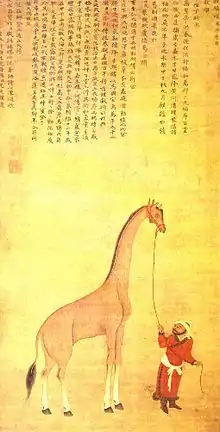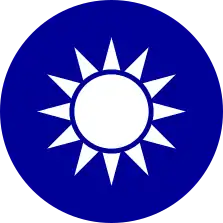Africa–China relations
Sino-African relations or Afro-Chinese relations refers to the historical, political, economic, military, social and cultural connections between China and the African continent.
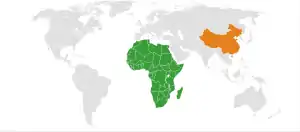 | |
AU |
China |
|---|---|
AU |
Taiwan |
|---|---|
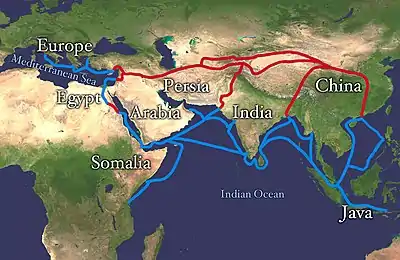
.svg.png.webp) |
|---|
| This article is part of a series on the politics and government of China |
|
|
Little is known about ancient relations between China and the African continent, though there is some evidence of early trade connections. Highlights of medieval contacts were the 14th-century journey of Ibn Battuta, the Moroccan scholar and traveller, to parts of China;[1] the 14th-century visit of Sa'id of Mogadishu, the Somali scholar and explorer, to China;[2] and the 15th-century Ming dynasty voyages of Chinese admiral Zheng He and his fleet, which rounded the coast of Somalia, passing the Ajuran Sultanate, and followed the coast down to the Mozambique Channel.
Modern political and economic relations commenced in the era of Mao Zedong, following the victory of the Chinese Communist Party in the Chinese Civil War. Starting in the 21st century, the modern state of the People's Republic of China has built increasingly strong economic ties with Africa. There are an estimated one million Chinese citizens residing in Africa.[3] Additionally, it has been estimated that 200,000 Africans are working in China.[4]:99 As of 2021, Eswatini and the self-declared Republic of Somaliland (recognised as part of Somalia) are the two African states to have relations with the Republic of China.[5]
Trade between China (PRC) and Africa increased by 700% during the 1990s,[6] and China is currently Africa's largest trading partner.[7] The Forum on China–Africa Cooperation (FOCAC) was established in October 2000 as an official forum to greatly strengthen the relationship. A few Western countries, such as the United Kingdom and the United States, have become very concerned over the significant political, economic and military roles China is playing in the African continent.
The Chinese Ministry of Foreign Affairs emphasises China's developmental engagements with Africa while also stating that China and Africa are making "joint efforts to maintain the lawful rights of developing countries and push forward the creation of a new, fair and just political and economic order in the world".[8]
Historical relations

China and Africa have a history of trade relations, sometimes through third parties, dating back as far as 202 BC and AD 220.[9] Ptolemy, writing in Roman Egypt in the 2nd century, knew of China by two separate routes: the silk road and the Indian Ocean trade. He thus identified two Chinese peoples: the Seres or silk people and the Sinai of the southern trade, whose name probably derives from the Qin dynasty.[10]
The first mention of Africa in Chinese sources was in the Yu-yang-tsa-tsu by Tuan Ch'eng-shih (died 863), a compendium of general knowledge where he wrote about the land of Po-pa-li (Berbera).
In 1071, an embassy arrived from an unidentified East African kingdom. Since it was a formal tribute mission (in the eyes of the Chinese), it is described in the official History of the Song Dynasty. The name of the kingdom was Ts'eng t'an and it was said to lie inland and mint its own coin. This name is probably derived from the Pesian Zangistan, and the title of its ruler, a-mei-lo a-mei-lan is probably derived from the Persian amir-i-amiran (emir of emirs).[11]
Archaeological excavations at Mogadishu in Ajuran Empire and Kilwa, Tanzania have recovered many coins from China. The majority of the Chinese coins date to the Song Dynasty, although the Ming Dynasty and Qing Dynasty are also represented, according to Richard Pankhurst.[12] In 1226 Chao Jukua, commissioner of foreign trade at Quanzhou in the Fujian province of China, completed his Chu-fan-chih (Description of Barbarous Peoples) which discusses Zanzibar (Ts'ong-pa) and Somalia (Pi-P'a-Lo).[13]
In addition, giraffes, zebras and incense were exported to the Ming Empire of China, making Somali merchants leaders in the commerce between Asia and Africa.[14] and influencing the Chinese language on Somali in the process.
In the 14th century, Moroccan traveler and scholar Ibn Battuta made a long journey to Africa and Asia. He reached China in April 1345 after a stay in India before serving as an envoy of Sultan Muhammad Tughlaq of the Indian Tughlaq dynasty to China.[1][15] He wrote:[16]
China is the safest, best regulated of countries for a traveler. A man may go by himself on a nine-month journey, carrying with him a large sum of money, without any fear. Silk is used for clothing even by poor monks and beggars. Its porcelains are the finest of all makes of pottery and its hens are bigger than geese in our country.
The Ming Dynasty voyages of Chinese admiral Zheng He and his fleet, which rounded the coast of Somalia and followed the coast down to the Mozambique Channel. The goal of those expeditions was to spread Chinese culture and signal Chinese strength. Zheng brought gifts and granted titles from the Ming emperor to the local rulers. In October 1415, Chinese explorer and admiral Zheng He reached the eastern coast of Africa and sent the first of two giraffes as gifts to the Chinese Yongle Emperor.[17]
There are some other accounts that mention Chinese ships sinking near Lamu Island in Kenya in 1415. Survivors are said to have settled in the island and married local women.[18][19]
Archaeologists have found Chinese porcelains made during the Tang dynasty (618–907) in Kenyan villages; however, these were believed to have been brought over by Zheng He during his 15th century ocean voyages.[20] On Lamu Island off the Kenyan coast, local oral tradition maintains that 20 shipwrecked Chinese sailors, possibly part of Zheng's fleet, washed up on shore there hundreds of years ago. Given permission to settle by local tribes after having killed a dangerous python, they converted to Islam and married local women. Now, they are believed to have just six descendants left there; in 2002, DNA tests conducted on one of the women confirmed that she was of Chinese descent. Her daughter, Mwamaka Sharifu, later received a PRC government scholarship to study traditional Chinese medicine (TCM) in China.[21][22][23]
National Geographic also published an article by Frank Viviano in July 2005, he visited Pate Island during the time he stayed on Lamu, ceramic fragments had been found around Lamu which the administrative officer of the local Swahili history museum claimed were of Chinese origin, specifically from Zheng He's voyage to east Africa. The eyes of the Pate people resembled Chinese and Famao and Wei were some of the names among them which were speculated to be of Chinese origin. Their ancestors were said to be from indigenous women who intermarried with Chinese Ming sailors when they were shipwrecked. Two places on Pate were called "Old Shanga", and "New Shanga", which the Chinese sailors had named. A local guide who claimed descent from the Chinese showed Frank a graveyard made out of coral on the island, indicating that they were the graves of the Chinese sailors, which the author described as "virtually identical", to Chinese Ming dynasty tombs, complete with "half-moon domes" and "terraced entries".[24]
According to Melanie Yap and Daniel Leong Man in their book "Colour, Confusions and Concessions: the History of Chinese in South Africa", Chu Ssu-pen, a Chinese mapmaker, in 1320 had southern Africa drawn on one of his maps. Ceramics found in Zimbabwe and South Africa dated back to Song dynasty China. Some tribes to Cape Town's north claimed descent from Chinese sailors during the 13th century, their physical appearance is similar to Chinese with paler skin and a Mandarin sounding tonal language. Their name for themselves is "abandoned people", Awatwa in their language.[25]
Contemporary relations
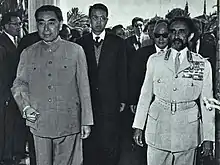
The establishment of modern Sino-African relations began in the late 50s, when China signed bilateral trade agreements with Algeria, Egypt, Guinea, Somalia, Morocco and Sudan. Zhou Enlai made a ten-country tour to Africa between December 1963 and January 1964. Zhou Enlai visited Ghana and established close relations with Kwame Nkrumah, who desired a united Africa.[26] Relations at that time were often reflective of China's foreign policy in general: China "began to cultivate ties and offer ... economic, technical and military support to African countries and liberation movements in an effort to encourage wars of national liberation and revolution as part of an international united front against both superpowers".[27] China had also supported Africa during its struggle against European colonialism.
Diplomacy
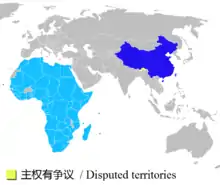

Early modern bilateral relations were mainly affected by the Cold War and the communist ideology. China originally had close ties with the anti-apartheid and liberation movement, African National Congress (ANC), in South Africa, but as China's relations with the Soviet Union worsened and the ANC moved closer to the Soviet Union, China shifted away from the ANC towards the Pan-Africanist Congress.[28] The Soviet supported Joshua Nkomo's Zimbabwe African People's Union, and supplied them with arms; Robert Mugabe's attempts to gain Soviet support for his Zimbabwe African National Union were rebuffed, leading him to enter into relations with China.[29][30][31] China adopted several principles, among them supporting the independence of African countries while investing in infrastructure projects.[32][33] In 1970s the expulsion of the Soviet military advisers from Egypt and Sudan was welcomed and arms supplies by China.[34][35][36] China and Zaire (and Safari Club) shared a common goal in Africa, namely doing everything in their power to halt Soviet gains in the area. Accordingly, both Zaire and China covertly funneled aid to the FNLA (and later, UNITA) in order to prevent the MPLA, who were supported and augmented by Cuban, from coming to power.[37] China and Safari Club sent assistance to support the Mobutu regime during the Shaba I conflict, 1977.[38] The Somali Democratic Republic established good relations with the Soviet Union throughout the Cold War era. When Somalia sought to create a Greater Somalia, it declared war on Ethiopia and took the Ogaden region in three months with the help of Soviet aid, but when the Soviet Union shifted its support from Somalia to Ethiopia the latter retook the Ogaden. This angered Siad Barre, and expelled all Soviets advisors and citizens from Somalia, China and Safari Club supported Somalia diplomatically and with token military aid.[39][40]
The question of Taiwan has been a key political issue for the People's Republic of China (PRC). In 1971, the support of African nations was crucial in the PRC joining the United Nations (UN), taking over the seat of the ROC on Taiwan.[41] Many African countries, such as Algeria, Egypt, Ethiopia, and Zambia have stressed their support to "one-China policy". Only one African country, Swaziland, still maintains relations with Taipei.[42] For the quest of a permanent UN seat for Africa, Nigeria, the largest African country, relies on Chinese support while Egypt looks to U.S. backing.[43]
Since 1997, around 40 African heads of state have visited the PRC.[44] The ministerial meeting, Forum on China-Africa Cooperation (FOCAC), held in Beijing in October 2000 was the first collective dialogue between the PRC and African nations.
In July 2019, UN ambassadors of 37 countries, including Algeria, Angola, Cameroon, Congo, DRC, Egypt, Eritrea, Nigeria, Somalia, South Sudan, Sudan, Zimbabwe, and other African states, have signed a joint letter to the UNHRC defending China's treatment of Uyghurs and other Muslim minority groups in the Xinjiang region.[45]
Economic
In 1980, the total Sino-African trade volume was US$1 billion.[7] In 1999, it was US$6.5 billion[46] and in 2000, US$10 billion.[7] By 2005, the total Sino-African trade had reached US$39.7 billion before it jumped to US$55 billion in 2006, making China the second largest trading partner of Africa after the United States, which had trade worth US$91 billion with African nations. The PRC also passed the traditional African economic partner and former colonial power France, which had trade worth US$47 billion.[47] In 2010, trade between Africa and China was worth US$114 billion[7] and in 2011, US$166.3 billion.[48] In the first 10 months of 2012 it was US$163.9 billion.[48]
There are an estimated 800 Chinese corporations doing business in Africa, most of which are private companies investing in the infrastructure, energy and banking sectors[49] Investments from Chinese entrepreneurial migration have culminated in positive (indirect jobs) and negative (displacing local traders) effects in local African societies[50] Unconditional and low-rate credit lines (rates at 1.5% over 15 years to 20 years)[51] have taken the place of the more restricted and conditional Western loans[49] Since 2000, more than $10bn in debt owed by African nations to the PRC has been canceled.[51]
One-third of China's oil supplies comes from the African continent, mainly from Angola.[52] Investments of Chinese companies in the energy sector have reached high levels in recent years. In some cases, like in Nigeria and Angola, oil and gas exploration and production deals reached more than $2 billion.[53][54] Many of those investments are mixed packages of aid and loan in exchange for infrastructure building and trade deals.
In agriculture, Benin and the Sahel countries of Burkina Faso and Mali supply up to 20% of China's cotton needs. While Côte d'Ivoire supplies China with cocoa,[55] large shipments of coffee are imported from Kenya. As for fish products, Namibia remains one of the main providers.[56]
During the year 2011, trade between Africa and China increased a staggering 33% from the previous year to US$166 billion. This included Chinese imports from Africa equalling US$93 billion, consisting largely of mineral ores, petroleum, and agricultural products and Chinese exports to Africa totalling $93 billion, consisting largely of manufactured goods.[57] Outlining the rapidly expanding trade between the African continent and China, trade between these two areas of the world increased further by over 22% year-over-year to US$80.5 billion during the first five months of the year 2012.[57] Imports from Africa were up 25.5% to $49.6 billion during these first five months of 2012 and exports of Chinese-made products, such as machinery, electrical and consumer goods and clothing/footwear increased 17.5% to reach $30.9 billion.[57] China remained Africa's largest trading partner during 2011 for the fourth consecutive year (starting in 2008).
The need to protect China's increased investments in Africa have driven a shift away from China's traditional non-interference in the internal matters of other countries to new diplomatic and military initiatives to try to resolve unrest in South Sudan and Mali.[58] To protect its investment and cement its geopolitical rise, China has opened its first military base in Djibouti in the horn of Africa. Political scientists are of the view that this move marks a new phase in Sino-Africa relations: "The opening of the first Chinese military base in Africa in the summer of 2017 heralded a new era for Chinese foreign policy. As China’s economic and political ambitions continue to grow, the Djibouti base is expected to help in the maintenance of continental peace and security where necessary. This would enhance Beijing’s continued growth around the world, Africa in particular, where China has become the continent’s largest trading partner." [59]
During the December 2015 FOCAC meeting in Johannesburg, South Africa, China's paramount leader Xi Jinping pledged $60 billion over a three-year deal in loans and assistance to the African continent.[60] China's effort is to support factories manufacturing goods for export. Along with roads and ports, Nigerian President Muhammadu Buhari showed his desire to finish stalled railway projects along the coastline, specifically a 1400 km railway from Lagos to Calabar representing approximately 200,000 jobs.[61]
A 2020 report[62] synthesizing close to a hundred studies on Africa-China economic relations finds that economic engagement with China supported Africa's economic transformation.
Aid
China strongly supported African Independence Movements and gave aid to newly independent African nations in the 1960s and 1970s. Among the most notable early projects was the 1,860 km TAZARA Railway, linking Zambia and Tanzania, which China helped to finance and build from 1970 to 1975.[63] Some 50,000 Chinese engineers and workers sent to the continent to complete the project. By 1978, China was giving aid to more African countries than the United States.[64] Since China is becoming a major donor for Africa, there is need for African governments to formulate appropriate mechanisms in order to make use of it towards advancing African economies.[65] Chinese aid comes with less strings attached then Western aid with it being "far less restrictive and doctrinaire".[66]
The African Union headquarters was built and fully funded by the Chinese government,[67] although China was alleged to have spied on the servers at the AU's headquarters from 2012 to 2017. China denied the accusation, however the AU replaced their servers after the report.[68]
Health care
China has been engaged in a kind of "health diplomacy" towards Africa since the 1960s. Health care development and medical assistance have been one of the main successful areas of cooperation. Between the early 1960s and 2005, more than 15,000 Chinese doctors traveled to Africa to help treat patients in more than 47 countries.[69] The medical teams, known as yiliaodui, have treated more than 170 million patients during the same period.
In 2001, the member nations of G8, formed the United Nations-backed Global Fund to Fight AIDS, Tuberculosis and Malaria with an initial budget of $10 billion. In 2007, another additional $1.1 billion was approved in Kunming, China, of which 66% was dedicated to Africa.[70] In September of the same year, China promised the Democratic Republic of the Congo to build 31 hospital units and 145 smaller health care centers, a project due to be completed in March 2010.[71][72]
Military
Military cooperation goes back to the Cold War period when China was keen to help African liberation movements. Apart from some traditional allies such as Somalia and Tanzania, China also had military ties with non-aligned countries such as Egypt. Military equipment worth $142 million was sold to African countries between 1955 and 1977.[51] Two decades after the collapse of the Soviet Union, military relations are now based on business interests rather than ideology.[73]
More recently, China has sent troops to the continent to participate in peacekeeping. In 2004, China deployed around 1,500 military personnel under the UN umbrella, dispatched between Liberia and the Democratic Republic of the Congo,[51] though only since 2011 has it sent infantry troops describable (arguably) as 'combat' forces.[74] In July 2007, China support of the passage of UN Security Council Resolution 1769 and contributes troops to UN-AU hybrid peacekeeping force(UNAMID).[75] China also has 14 attachés in 14 different African countries as of 2007, while there are 18 African countries who maintain their attachés in Beijing.[76] Apart from peacemaking, China provides military training and equipment to a few countries, though this does not require military forces to be deployed. During the December 2015 FOCAC meeting in Johannesburg, South Africa, Chinese leader Xi Jinping restated "China strongly believes Africa belongs to the African people and African problems should be handled by the African people."[60] China's latest military efforts are to combat terrorist radicalism, and not the local African conflicts. Chinese Drones have proliferated across the Africa, executing hundreds of deadly attacks in Egypt, Libya, Algeria, Nigeria.[77]
An increasing number of African countries have shifted their source of supply from traditional providers such as Russia to China due in part to the competitive prices offered by Chinese suppliers.[78] Arms sales by China to some African states have troubled Western critics who point out some buyers like Sudan are accused of war crimes.[79]
In contrast to critics, Carter Ham, a former US Army General in charge of U.S. Africa Command, spoke in favor of the benefits and potential cooperation between China and the US in the African military sphere, offering as examples Chinese supplied patrol boats to the DRC military and building by Chinese contractors of a military institute in Tanzania as Chinese hardware that could be combined with US training to form joint assistance for African militaries.[80][81] Former U.S. military contractor Erik Prince's Frontier Services Group has close ties to the Chinese state-owned CITIC Group and provides security, training services to Chinese firms operating in Africa.[82]
In July 2017, China set up its first overseas military base at Djibouti in Africa.
Culture

Africa is a host of three Chinese cultural centers. The first overseas Chinese center was opened in Mauritius in 1988. Two other followed in Egypt and Benin. The Confucius Institute, which focuses on the promotion of the Chinese language and culture, has 20 centers distributed around 13 African countries.[83]
Historically, little is known about early African immigration to China. As economic and political ties have strengthened, many Africans have relocated to China seeking better economic opportunities. Places dubbed 'Little Africa' and 'Chocolate City' are increasingly receiving new immigrants, mostly Nigerians. Most of the African immigrants are concentrated in the area of Guangzhou with an estimated number of 20,000.[84] It is estimated that there are around 10,000 illegal African immigrants in China and police crackdowns have intensified since early 2009.[85]
In contrast, early Chinese immigration to the African continent is slightly better documented. In 1724, a few Chinese convicts were brought as labourers to South Africa from the Dutch East Indies (modern-day Indonesia) by the colonial Dutch Empire. In the early 19th century, another wave of immigrants came to South Africa as workers brought by the British to work in agriculture, infrastructure building and mining.[86] In recent years, there has been an increasing presence of Chinese in Africa with one estimate numbering Chinese nationals at one million.
Criticism
There are a variety of critical perspectives scrutinizing the Chinese role in the relationship focused on the balance of the power relationship and human rights.[87] Increasingly, concerns have been raised by Africans as well as outside observers that China's relationship with Africa is neocolonialist in nature.[88][89] As a response to such criticism, China issued the Nine Principles to Encourage and Standardise Enterprises' Overseas Investment, a charter and guide of conduct to Chinese companies operating abroad.[90]
The China-Zimbabwe relationship drew the attention of such critics. China was accused of supplying Zimbabwe with jet fighters, vehicles and other military equipment.[91] China declared in 2007 that it was dropping all kinds of assistance and limiting assistance to humanitarian aid.[92] In July 2008, the Chinese diplomacy asked Mugabe "to behave" though critics see that as a way for China to protect its own interests in this country should a regime change.[93]
Another high-profile event involving critics of China in Africa was in the run-up to the 2008 Summer Olympics. Human rights groups criticized China for its supportive relationship with the government of Sudan, which is accused of mass killings in Darfur.[94][95] China is Sudan's largest economic partner, with a 40% share in their oil,[96] and also sells Sudan small arms.[97] China has threatened to veto UN Security Council actions to combat the Darfur crisis,[98] and has argued that, "As the Darfur issue is not an internal affair of China, nor was it caused by China, to link the two together is utterly unreasonable, irresponsible and unfair."[99]
See also
- Reserve currency
- Internationalization of the renminbi
- List of People's Republic of China diplomatic missions
- List of diplomatic missions of the Republic of China
- Sino-Third World relations
- Caribbean–People's Republic of China relations
- Sino-Pacific relations
- AU Conference Center and Office Complex
- Debt-trap diplomacy
References
- Gin Ooi, Keat (2004) [2004]. Southeast Asia: a historical encyclopedia, from Angkor Wat to East Timor. ABC-CLIO. p. 626. ISBN 978-1-57607-770-2.
- Between the Middle Ages and modernity: individual and community in the early By Charles H. Parker, Jerry H. Bentley pg 160
- "Africa and China: More than minerals". The Economist. 23 March 2013. Retrieved 29 March 2013.
- Mathews, Gordon and Yang Yang (2012). "How Africans Pursue Low-End Globalization in Hong Kong and Mainland China". Journal of Current Chinese Affairs. Retrieved 15 July 2012.
- https://www.voanews.com/africa/taiwan-china-diplomatic-competition-comes-somaliland?amp
- China's trade safari in Africa - Le Monde Diplomatique, May 2005
- Peter Wonacott (2 September 2011). "In Africa, U.S. Watches China's Rise". The Wall Street Journal. Retrieved 19 July 2012.
- "China-Africa Relations", Ministry of Foreign Affairs of the People's Republic of China, 25 April 2002
- Snow 1988, p 2
- J. Lennart Berggren and Alexander Jones (eds.), Ptolemy's Geography: An Annotated Translation of the Theoretical Chapters (Princeton University Press, 2000), p. 176.
- Paul Wheatley (1964), "The land of Zanj: Exegetical Notes on Chinese Knowledge of East Africa prior to A. D. 1500", in R. W. Steel and R. M. Prothero (eds.), Geographers and the Tropics: Liverpool Essays (London: Longmans, Green and Co.), pp. 139–188, at 156–157.
- Pankhurst, Richard (1961). An Introduction to the Economic History of Ethiopia. London: Lalibela House. ASIN B000J1GFHC., p. 268
- Freeman-Grenville 1975
- East Africa and its Invaders pg.37
- "Ibn Battuta's Trip: Part Nine - Malaysia and China (1345–1346)". Archived from the original on 18 April 2009. Retrieved 19 March 2009.
- "Ibn Battuta and Zheng He, the tourist and the admiral". Archived from the original on 28 January 2003. Retrieved 19 March 2009.
- Snow 1998, p. 23
- Eliot, Charles (1966). The East African Protectorate. Routledge. p. 11. ISBN 978-0-7146-1661-2.
- "Kenyan girl with Chinese blood steals limelight". Chinese Embassy in Kenya. Archived from the original on 8 May 2013. Retrieved 3 April 2009.
- "Children of the master voyager?", People's Daily, 3 November 2006, retrieved 30 March 2009
- "Is this young Kenyan Chinese descendant?", China Daily, 11 July 2005, retrieved 30 March 2009
- York, Geoffrey (18 July 2005), "Revisiting the history of the high seas", The Globe and Mail, retrieved 30 March 2009
- Brautigam, Deborah (2009). "The Dragon's Gift: The Real Story of China in Africa". Oxford University Press. p. 28. at Google Books.
- Frank Viviano (July 2005). "China's Great Armada, Admiral Zheng He". NATIONAL GEOGRAPHIC. p. 6. Retrieved 29 September 2011.
- Alex Perry (1 August 2008). "A Chinese Color War". TIME. Retrieved 29 September 2011.
- "The Confused Moments of Nkrumah in China After The Coup". modernghana.com. Retrieved 19 August 2018.
- Muekalia 2004, p.6
- Taylor 2000, p. 93
- Blair, David (2002). Degrees in Violence: Robert Mugabe and the Struggle for Power in Zimbabwe. London and New York: Continuum. ISBN 978-0-8264-5974-9. p. 23
- Meredith, Martin (2002). Our Votes, Our Guns: Robert Mugabe and the Tragedy of Zimbabwe. New York: Public Affairs. ISBN 978-1-58648-186-5. pp. 36–37
- Alao, Abiodun (2012). Mugabe and the Politics of Security in Zimbabwe. Montreal and Kingston: McGill-Queen's University Press. ISBN 978-0-7735-4044-6. p. 20.
- "China offers Africa billions, 'no strings attached'". DW.COM. Deutsche Welle. 3 September 2018. Retrieved 1 May 2019.
- Genin, Aaron (30 April 2019). "FRANCE RESETS AFRICAN RELATIONS: A POTENTIAL LESSON FOR PRESIDENT TRUMP". The California Review. Retrieved 1 May 2019.
- Sudan, Civil War, and Terrorism, 1956-99. By Edgar O'Ballance. New York: St Martin's Press, and London: Macmillan Press, 2000. p.111
- "EGYPT AND CHINA SIGN ARMS PACT, HAIL CLOSER TIES". The New York Times. 22 April 1976. Retrieved 26 December 2019.
- "China Will Sell Arms to Egypt, Sadat Announces". The Washington Post. 6 June 1979. Retrieved 26 December 2019.
- The Oxford Handbook of the Cold War. Front Cover. Richard H. Immerman, Petra Goedde. Oxford University Press, 2013 p.276
- A Little Help from His Friends Time, 25 April 1977, Vol. 109 Issue 17, p.57
- "Russians in Somalia: Foothold in Africa Suddenly Shaky". The New York Times. 16 September 1977. Retrieved 5 January 2020.
- "the ogaden situation" (PDF). Central Intelligence Agency. Retrieved 5 January 2020.
- "From "brothers" to "partners": China, Africa building strategic ties". Embassy of the People's Republic of China in the Arab Republic of Egypt. Retrieved 14 March 2009.
- "China woos Taiwan's African friends". afrol.com. Retrieved 14 March 2009.
- "Africa and the UN Security Council Permanent Seats". pambazuka.org. Retrieved 14 March 2009.
- "China-Africa Relations". Ministry of Foreign Affairs, the People's Republic of China. Retrieved 14 March 2009.
- "Which Countries Are For or Against China's Xinjiang Policies?". The Diplomat. 15 July 2019.
- "Sino-African Relations". www.chinaembassy.org.zw.
- "China boosts African economies, offering a 'second opportunity'". Christian Science Monitor. Archived from the original on 24 June 2009. Retrieved 14 March 2009.
- "Mozambique-China Trade Continues to Grow". allafrica.com. 9 December 2012. Retrieved 9 December 2012.
- "Africa, China Trade" (PDF). Financial Times. Archived from the original (PDF) on 11 March 2009. Retrieved 14 March 2009.
- Dankwah, Kwaku Opoku and Marko Valenta (2019). "Chinese entrepreneurial migrants in Ghana: socioeconomic impacts and Ghanaian trader attitudes". Journal of Modern African Studies. 57: 1–29. doi:10.1017/S0022278X18000678.
- "China's trade safari in Africa". Le Monde Diplomatique. May 2005. Retrieved 14 March 2009.
- "China, Africa, and Oil". Council on Foreign Relations. Archived from the original on 8 February 2009. Retrieved 14 March 2009.
- Linebaugh, Kate; Oster, Shai (10 January 2006). "Cnooc Pays $2.27 Billion For Nigerian Oil, Gas Stake". Wall Street Journal. Retrieved 14 March 2009.
- Lee, Don (14 November 2004). "China Barrels Ahead in Oil Market". Los Angeles Times. Retrieved 14 March 2009.
- from US$39,7 million in 2001 to $113,5 million in 2005 (source:intracen.org)
- "Africa, China Trade" (PDF). Financial Times. Archived from the original (PDF) on 11 March 2009. Retrieved 14 March 2009.
- "China-Africa Trade Booms | JOC.com". www.joc.com.
- Johnson, Keith (24 April 2014). "China's African Adventure". www.foreignpolicy.com. Graham Holdings Company. Retrieved 25 April 2014.
- Jeng, Amat. "Sino-Gambia". Cite journal requires
|journal=(help) - "China's Xi cheers African leaders with pledge of $60 billion for development". Reuters. 4 December 2015. Retrieved 5 December 2015.
- "Buhari Meets With Chinese President Xi Jinping in South Africa". Sahara Reporters. 4 December 2015. Retrieved 5 December 2015.
- Calabrese, Linda and Tang, Xiaoyang (2020). Africa's economic transformation: The role of Chinese investment (Report). DEGRP.CS1 maint: multiple names: authors list (link)
- Brautigam 2010: 40–41
- Brautigam 2010: 42
- Paul Kipchumba, Africa in China's 21st Century: In Search of a Strategy, Nairobi: Kipchumba Foundation, 2017
- Jacques, Martin. When China Rules the World. Penguin Books. p. 426.
- Linyan, Wang (30 January 2012). "New headquarters shows partnership entering era of hope: Ethiopia PM". China Daily. Retrieved 16 July 2019.
- Dahir, Abdi Latif. "China "gifted" the African Union a headquarters building and then allegedly had it bugged". Quartz Africa. Retrieved 6 February 2021.
- Thompson, Drew. "China's soft power in Africa: From the "Beijing Consensus" to health diplomacy". jamestown.org. Retrieved 14 March 2009.
- "China, U.S. and Africa: Competition or Cooperation?" (PDF). The Defense Technical Information Center p.17. Archived from the original (PDF) on 10 March 2012. Retrieved 14 March 2009.
- "The Chinese and Congo take a giant leap of faith". iht.com. Retrieved 14 March 2009.
- "Copper Colony in Congo". Le Monde diplomatique. Retrieved 14 March 2009.
- China's Energy Strategy: The Impact on Beijing's Maritime Policies ed. by Gabriel B. Collins, Andrew S. Erickson, Lyle J. Goldstein, and William S. Murray. Annapolis: Naval Institute Press, 2008. p.44 ISBN 978-1-59114-330-7.
- Reed, John (15 July 2013). "China's Combat Troops in Africa". The Complex. Archived from the original on 27 August 2014. Retrieved 31 August 2014.
- "WHAT EXPLAINS CHINA'S DEPLOYMENT TO UN PEACEKEEPING OPERATIONS?". Columbia University. 3 December 2015. Retrieved 27 December 2019.
- "Military backs China's Africa adventure". Asia Times. Archived from the original on 21 July 2012. Retrieved 14 March 2009.
- "Chinese Drones Are Going to War All Over the Middle East and Africa". National Interest. 29 September 2019. Retrieved 27 December 2019.
- "Russian, Chinese weapons compete in Africa". upiasia.com. Retrieved 14 March 2009.
- "China 'is fuelling war in Darfur'". BBC. 13 July 2008. Retrieved 14 March 2009.
- "United States Africa Command". www.africom.mil.
- "The United States Africa Command: Protecting US Interests and Supporting African Capacity". Chatham House.
- "Is Blackwater founder's lucrative security-training deal with Chinese insiders against US interests?". Stars and Stripes. 4 May 2008. Retrieved 27 December 2019.
- "Confucius Institute Bridges Friendship between China and Africa". cri.com.cn. Retrieved 14 March 2009.
- Evan Osnos (9 February 2009). "The Promised Land". The New Yorker. Retrieved 14 March 2009.
- "China's 'Little Africa' is under pressure". globalpost.com. Archived from the original on 28 February 2009. Retrieved 14 March 2009.
- "China and Africa: Stronger Economic Ties Mean More Migration". Migration Policy Institute. Retrieved 14 March 2009.
- John M. Friend; Bradley A. Thayer (1 November 2018). How China Sees the World: Han-Centrism and the Balance of Power in International Politics. University of Nebraska Press. ISBN 978-1-64012-137-9.
- Blair, David (31 August 2007). "Why China is trying to colonise Africa". The Daily Telegraph. London. Retrieved 14 March 2009.
- "China as Africa's 'angel in white'". Asia Times. Retrieved 14 March 2009.
- "The Forest for the Trees: Trade, Investment and the China-in-Africa Discourse" (PDF). Barry Sautman, Hong Kong University of Science & Technology Yan Hairong, University of Hong Kong. Retrieved 14 March 2009.
- Beresford, David (18 April 2008). "Chinese ship carries arms cargo to Mugabe regime". guardian.co.uk. London. Retrieved 14 March 2009.
- Spencer, Richard (31 August 2007). "China is to withdraw backing for Mugabe". The Daily Telegraph. London. Retrieved 14 March 2009.
- Evans, Ian (26 July 2008). "Robert Mugabe forced into talks with opposition after China told him 'to behave'". The Daily Telegraph. London. Retrieved 14 March 2009.
- "Why China Won't Save Darfur". Foreign Policy. Retrieved 14 March 2009.
- "Beyond Darfur - Sudan's Slide Toward Civil War". Foreign Affairs. Archived from the original on 18 December 2008. Retrieved 14 March 2009.
- "The "Big 4" – How oil revenues are connected to Khartoum". Amnesty International USA. Archived from the original on 3 October 2008. Retrieved 14 March 2009.
- "Oil for China, Guns for Darfur". businessweek. Retrieved 14 March 2009.
- "The United Nations and Darfur". Human Rights Watch. Retrieved 14 March 2009.
- "China: Darfur-Olympic link 'unfair'". aljazeera.net. Retrieved 14 March 2009.
Further reading
| Library resources about Africa–China relations |
- Dankwah Kwaku Opoku & Valenta Marko (2019). "Chinese entrepreneurial migrants in Ghana: socioeconomic impacts and Ghanaian trader attitudes". Journal of Modern African Studies. 57 (1). pp. 1–29. doi:10.1017/S0022278X18000678.
- Freeman-Grenville, G.P.S., ed. (1975). The East African Coast. Select Documents form the first to the earlier nineteenth century. London: Rex Collings.
- Snow, Philip (1988). The Star Raft: China's encounter with Africa. New York: Weidenfeld & Nicolson. ISBN 978-1-55584-184-3.
- Taylor, I. (1998). "China's foreign policy towards Africa in the 1990s". Journal of Modern African Studies. 36 (3). pp. 443–460. doi:10.1017/S0022278X98002857.
- Cornelissen, Scarlett; Taylor, Ian (2000). "The Political Economy of China and Japan's Relationship with Africa: a Comparative Perspective". Pacific Review. 13 (4): 615–633. doi:10.1080/095127400455350. S2CID 154734964.
- Muekalia, D.J. (2004). "Africa and China's strategic partnership". African Security Review. 13 (1). pp. 5–11.
- Taylor, Ian (2006). China and Africa: Engagement and Compromise. London: Routledge. ISBN 978-0-415-39740-7.
- Alden, Chris (2007). China in Africa: Partner, Competitor or Hegemon?. Zed Books. ISBN 978-1-84277-864-7.
- Breslin, Shaun; Taylor, Ian (2008). "Explaining the Rise of 'Human Rights' in Analyses of Sino-African Relations" (PDF). Review of African Political Economy. 35 (115): 59–71. doi:10.1080/03056240802011469. S2CID 144597487.
- Hellström, Jerker (2009). China's Emerging Role in Africa: a Strategic Overview. Swedish Defence Research Agency (FOI). ISBN 978-1-84277-864-7.
- Taylor, Ian (2009). China's New Role in Africa. Boulder: Zed Books. ISBN 978-1-58826-636-1.
- Wyatt, Don J. (2009). The Blacks of Premodern China. Encounters with Asia. University of Pennsylvania Press. ISBN 978-0-8122-4193-8.
- Brautigam, Deborah (2010). The Dragon's Gift: The Real Story of China in Africa. Oxford University Press. ISBN 978-0-19-955022-7.
- Taylor, Ian (2011). The Forum on China-Africa Cooperation (FOCAC). London: Routledge. ISBN 978-0415628518.
- Caniglia, Laura (2011). "Western ostracism and China's presence in Africa". China Information. 25 (2): 165–184. doi:10.1177/0920203X11406339. S2CID 144485159. Retrieved 28 August 2012.
- Calabrese, Linda (ed.) (2016). China-Africa: a maturing relationship? Growth, change and resilience London: DFID-ESRC Growth Research Programme.
- Taylor, Ian (2017). China's Aid to Africa: Does Friendship Really Matter?. London: Routledge. ISBN 9781138630390.
- Calabrese, Linda and Tang, Xiaoyang (2020). Africa's economic transformation: the role of Chinese investment (Report). DEGRP.CS1 maint: multiple names: authors list (link)
External links
Academic research
- The Balancing Act of China's Africa Policy - (Wenping, He) Institute of West-Asian and African Studies, Chinese Academy of Social Sciences. China Security Vol. 3 No. 3 Summer 2007
- The Forest for the Trees: Trade, Investment and the China-in-Africa Discourse - (Sautman, Barry) Hong Kong University of Science & Technology / (Hairong, Yan) University of Hong Kong 28 May 2007
- Zhiqun Zhu (2007). "China's New Diplomacy in Africa (post 1990)" (PDF). Pr. of International Political Economy and Diplomacy of Bridgeport, USA.
Media special reports
- Africa-China Trade - Financial Times
- Africa-China - Pambazuka.org, an African social justice watchdog
Media articles
- The summit in Beijing, Stephen Marks for Pambazuka.org - 14 December 2006
- China in Africa: Developing ties, BBC News - 29 November 2007
Institutional links
- China's role in development in Africa: Challenging the EU approach, Gisela Grieger, Library Briefing, Library of the European Parliament, 8 May 2013
- Africa's Burgeoning Ties with China - Finance & Development, a quarterly magazine of the International Monetary Fund, March 2008, Volume 45, Number 1
- The Rise of China and India - What's in it for Africa, Goldstein et al., for the Organisation for Economic Co-operation and Development, May 2006
Official links
- China-Africa Cooperation Forum
- China's African Policy - Ministry of Foreign Affairs, the People's Republic of China
- "China-Africa Relations", Ministry of Foreign Affairs of the People's Republic of China, 25 April 2002
- Fairly looking upon Sino-African relations, People's Daily - 16 May 2006
- "Chinese FM calls for strengthening of new Sino-African strategic partnership", Xinhua, 11 January 2010
- Assessing China's Role and Influence in Africa: Hearing before the Subcommittee on Africa, Global Health, and Human Rights of the Committee on Foreign Affairs, House of Representatives, One Hundred Twelfth Congress, Second Session, March 29, 2012
